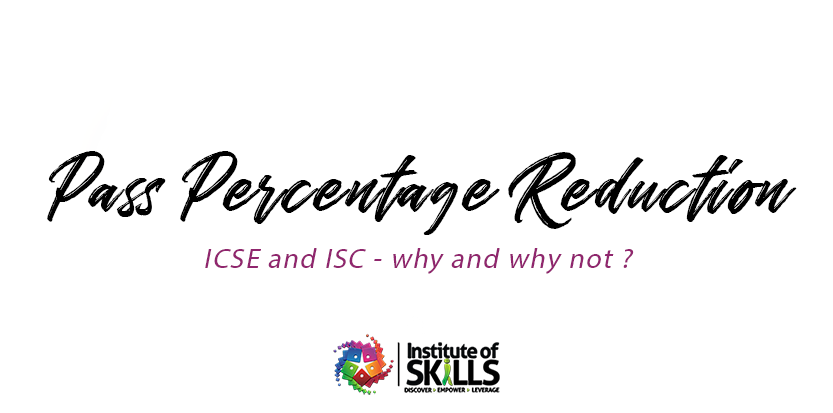- November 29, 2017
- Posted by: Enrichment Catalyst
- Category: Empowering Education

As soon as the Council for Indian School Certificate Examination (CISCE) brought down the pass percentage for ICSE (Class X) and ICS (Class XII) examinations from 35% to 33% and from 40% to 35% respectively and as the media published the news, there must have been diverse reactions from diverse people. Students mostly might have felt happy. Some parents would have felt happy and some would have felt bad about this. Teachers also would have had mixed emotions. Schools would have been really happy because this makes it easier for them to show 100% pass result. People in the educational sector apart from teachers will be having a debate on this topic like how we had in the video. You might have known from the video about the basic advantages and problems of this change. And, here we go a little deeper. Let’s start with the problems.
Why Not?
Agreeing with Ms. Ayesha’s point, the reduction in pass percentage seems an easy way to get over the schooling levels. Anything made too easy will be less effective. So, the quality becomes skeptical. When students are given their grades and end certificates with very less effort, they tend to lose interest and turn reluctant and lethargic. There is no compulsion for them to spend their time in education diligently. The end result will be that the quality of students is reduced and when the students are not trained to put considerable amount of effort in studies during school. Aftermath of this laziness will be the same lethargic sensation continuing in their colleges where quality and hard work is required a lot and that in turn will reflect on the employment, resulting in increased unemployment or less supply of talented employees in a place of more demand. Knowledge has to be obtained with seriousness and grasped in a way that it can be applied properly in future. So, the reduction in pass percentage seems to be kind of dangerous in affecting the talent output and in turn the economy of the whole nation. If qualified students are very less in a country so will the hope of the country’s future be.
Why?
The reduction in pass percentage though it is argued to make the students lethargic and disinterested towards studies, it has one advantage to those who have talents in different fields. If a student is so good in sports or any art, he/she might not prove them with scores. But, when the education system demands a pass from school and then provide admission further, the reduction of 2% and 5% will be really helpful to them. There are even students who don’t score well but if they are in a practical situation, they just over ride everyone else. Like, a student may not have scored well in computer examination but still be an unbeatable ethical hacker or app developer. Of course, we know the personalities who were school and college drop outs but built an empire and hired those with high pass percentage. This reduction will help those students to get to the next stage without having to worry about scoring a lot. Other than that, with the education system where scores are not actually a proof of knowledge, this reduction in percentage is not going to answer either the “Why?” or “Why not?” strongly.
Solutions
So, if it’s not stable and productive to reduce or increase or stabilise the pass percentage, the next shift of thoughts should be “What else can be done?” We have to concentrate on what is lacking and why the percentage is not impacting the education quality much. So, when we look at it we can clearly see we need a change or some complement to the education system. People need to be both knowledgeable and skilful to be qualified students. So, the skills part needs concentration. Students must be taught “innovation” and not memorisation. Memorisation is the major part that makes us lose trust on percentage. That has to be replaced with creative skills and innovative application of knowledge. At the same time, the knowledge part should also not be ignored completely for it might bring a new issue of how to develop the knowledge in students who only have skills. Knowledge is the base on which skills build the structure. So, there must be a balance between knowledge and skills not letting one over rule the other and the way both are taught must be effective. There might be a debate over this solution too. But, at least there is a solution to debate on and come to a conclusion.
